In the Zone of Nonbeing
Frantz Fanon in his time—and in ours.
The Enigma of Frantz Fanon
A revolutionary and an intellectual, a nationalist and a cosmopolitan, a doctor and a revolutionary, Fanon was always multiple.
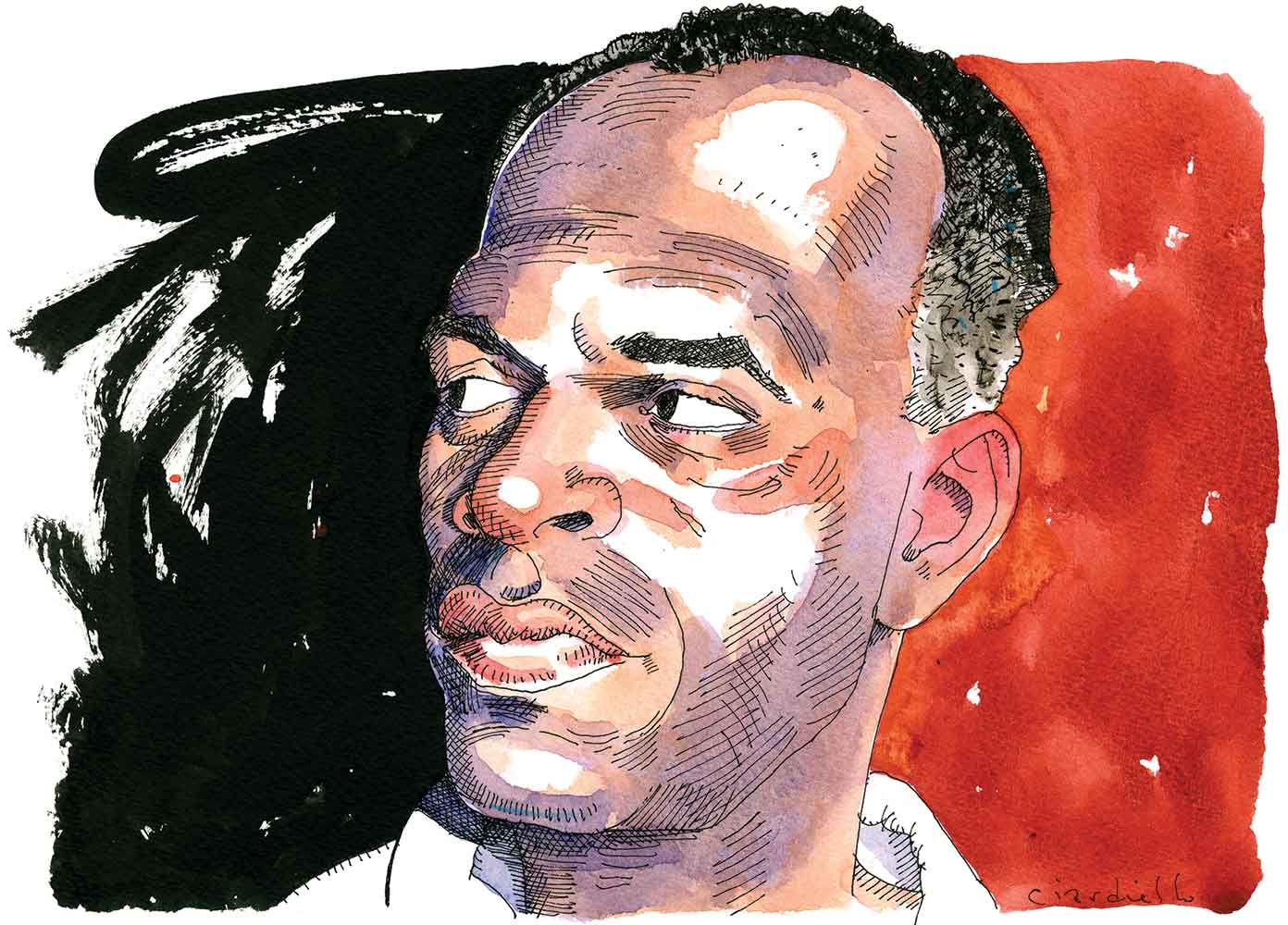
During the first weeks of Israel’s bombardment of Gaza, I biked through the streets of New York weeping. Once home, the hours I spent reading about Palestine slowly developed into an obsessive ritual. I took screenshots of each new outrage against humanity. I downloaded every video of this violence, which seemed both distant and immediate in its horror. My somewhat pointless acts of witnessing constituted a desperate attempt to archive an already historic present, to save its texts, jpegs, and avi files in the face of a world that was not concerned with saving Palestinian life.
Books in review
The Rebel’s Clinic: The Revolutionary Lives of Frantz Fanon
Buy this bookIn my state of mourning, in which I did not quite know how to be a person, I also did something else: I read Frantz Fanon. Perhaps the most infamous postwar anti-colonial intellectual, Fanon had fled his Caribbean homeland of Martinique and the heady cultural ferment of postwar France and joined the Algerian war for independence. As I read his descriptions of a violent revolt by Arab insurgents against the settlers occupying their country, his words struck me with temporal vertigo. Scarcely had I lifted my eyes from his description of settlers reducing the natives to “zoological terms” than I read New York Times columnist Thomas Friedman characterizing Arabs and Iranians as an infestation of wasps, spiders, and insect eggs ready to hatch. As if some mischievous editor had swapped our proper nouns for his, Fanon seemed to be describing our present.
So long as colonialism endures, so too will Fanon’s critique of it, but his perpetual relevance can also be traced to a problem he presents his readers with: that of his charisma. No other political theorist sounds like Fanon, because no one else has written in a register so naturally attuned to both analysis and affect. His language is hyper-dense, muscular, barbed—force unleashed. Each sentence is a performance; each line advances with a tense, Beethoven-like straining, each word compressing an accusation, a worldview, and a social terrain of struggle. Fanon’s first book, Black Skin, White Masks, exposed the politics of cross-racial desire, and his last, The Wretched of the Earth, advanced a structural diagnosis of how settler colonial-power functioned. A writer of both fury and messianism, Fanon was always multiple. He was a revolutionary who wrote about love—simultaneously a theorist capable of sweeping geopolitical abstractions and a clinical psychiatrist who listened silently to the patients in his ward. A patron saint of Third World Jacobins, he also sought to heal the colonialists.
Like The Communist Manifesto, Fanon’s works often imparted something beyond their specific arguments: the announcement that another world was possible. For even as he described the divide between the French settler and the Algerian native as Manichaean, Fanon also speculated that they might one day recognize their shared humanity. Once the colonized people freed themselves, they could create a new society, one that molted off the identities of colonizer and colonized. But until that happened, Fanon directed his gaze back to the West, to those worlds from which empire and its violence emerged. No one, he insisted, is innocent of colonial violence—not even those of us in the metropole who weep over the massacres our own nations helped author.
For this reason, the arrival of Adam Shatz’s new biography, The Rebel’s Clinic: The Revolutionary Lives of Frantz Fanon, could not be more timely. Treating its subject with a healthy dose of veneration and criticism, Shatz’s book is also a remarkable work of intellectual synthesis: a comprehensive, readable introduction to Fanon’s writings that places his incredible life against the political and cultural debates that informed it. Joining a large body of work on Fanon—including David Macey’s definitive Frantz Fanon: A Biography—The Rebel’s Clinic introduces new material as well. For one thing, Shatz conducted extensive interviews with Fanon’s secretary, Marie-Jeanne Manuellan, whom Fanon called his “tape recorder” because of how accurately she would transcribe his thoughts as he performed his sentences in the air. The book also glitters with wonderful details, such as the fact that French policemen jailed Gabriel García Márquez because they thought he looked Algerian, or that Fanon’s wife, Josie, demanded that his publisher remove Jean-Paul Sartre’s preface from The Wretched of the Earth because Sartre’s “pro-Zionist attitudes” after the 1967 Six-Day War “were incompatible with Fanon’s work.”
Like Macey’s book, The Rebel’s Clinic seeks to demystify its larger-than-life subject. If the apocryphal Fanon tore off the straitjackets from his Algerian patients, we’re reminded by Shatz that the real Dr. Frantz prescribed sleeping tranquilizers and electroshock therapy for them. Airlifting Fanon from the purgatory of New Left nostalgia, Shatz instead puts him in conversation with Sartre, Albert Camus, V.S. Naipaul, and countless other literary figures.
But this approach can have its costs. In his effort to demythologize Fanon as a revolutionary, Shatz sometimes obscures the reasons why Macey called him the “apostle of violence.” In his own moment, Fanon’s most important readers were not literary figures like Camus and Naipaul—comparatively conservative writers whom Fanon likely never read—but the insurgents in the training camps of Che Guevara, the African National Congress, and the Palestinian fedayeen, as well as the Black Panthers, whose leader Eldridge Cleaver said Fanon’s words could be quoted by “every brother on a rooftop.” This revolutionary Fanon is also in Shatz’s book, though often quarantined from its more humanist, almost liberal portrayal of Fanon as the creator of a literary oeuvre.
The Rebel’s Clinic also tends to psychologize Fanon’s politics. Shatz relies on Tunisian theorist Albert Memmi’s declaration that what really motivated Fanon was a desire to belong, which means his commitment to the North African insurgency is sometimes reduced to a feeling—a longing to be accepted by what Shatz calls his “elusive object of love,” Algeria. Over and over again, Shatz traces Fanon’s public political commitments to private explanations—a standard tack for a biographer, but the opposite of Fanon’s own practice. For, as a doctor, Fanon widened the aperture of psychiatry and showed how the world also made a person; and as an insurgent, he identified the true agents of history as not its intellectual heroes but its masses.
Born in 1925, Fanon grew up in a middle-class family in Martinique, a French Caribbean colony split between a Black majority, a creole ruling class, and the béké—descendants from white planters. When the Nazis conquered France, Fanon wanted to join the resistance because he still believed in French republican ideals. His brother discouraged him by quoting their teacher: “Fire burns and war kills…. What is happening in Europe is no concern of ours. When whites are shooting each other, it is a blessing for Blacks.”
But Fanon remained undaunted. He fled Martinique in 1944 and joined the Free French Army in Morocco and Algiers, where he fought in the great struggle against fascism while also observing racial segregation in his own barracks. In fact, when the resistance triumphantly marched into France, the Free French Army held back its Black African soldiers so that the official liberation of Paris would appear to be accomplished only by whites.
These events foreshadowed Fanon’s own experiences when he moved to Lyon in 1946. As he drank in the thrilling currents of phenomenology and existentialism, he also experienced racist encounters that vitiated his faith in the French vision of egalitarianism. On the train, a boy spotted Fanon and said to his mother, “Look, maman, a nègre!” The word’s derogatory connotation in French is not unlike that of the N-word. “Look how handsome the nègre is,” the mother replied, as if Fanon were not there. He replied, with his characteristic aggressive charm, “The handsome nègre says, fuck you, madame.”
Fanon recounted this anecdote in Black Skin, White Masks, a wild, feverish deconstruction of the psychology of colonial racism and cross-racial relationships. Challenging the individualist circumference of psychiatry, Fanon insisted that we must look not only toward the self but also at the social conditions that turn all of humanity into peoples separated by race. While a typical psychiatrist might analyze the mind, Fanon also focused on the tormenting of the body, anticipating our own movements against police brutality. Oppressed people “revolt” when it becomes “impossible…to breathe,” he declared, words that originally referred to the Vietnamese resistance against the French but that also prefigured the dying words of Eric Garner and George Floyd.
Yet Black Skin, White Masks also ventured a plot twist. It narrates the grievances of being Black or Arab in French society only to announce that we must then transcend these externally imposed identities. The invention of racial categories, as Fanon later wrote, may have been “the white error,” but attempts to reclaim race constituted a “Black mirage.” Like the caste abolitionist B.R. Ambedkar, Fanon believed that freeing oneself from the colonizer meant annihilating rather than recuperating one’s race: “In the world I am heading for, I am endlessly creating myself…. I am not a slave to the slavery that dehumanized my ancestors.”
Fanon’s trickiness lies in how he seduces the reader with a moral outrage that he immediately deconstructs. Starting from a position of anti-colonial fury, his books ascend to a universalist crescendo. This can function like a trap for any reader who wants a monolithic Fanon, whether revolutionary or humanist, nationalist or internationalist, romantic or realist. Rather than stabilize him, we must allow him to be both—sometimes at once but at other times in progression. We must accept the dialectical Fanon, a thinker larger than the mutually defining opposites he described. To understand him, we cannot split him, as the psychiatrists would say. For in protecting Fanon from one aspect of himself, we ultimately end up trying to protect ourselves.
Far more sympathetic to Fanon the cosmopolitan humanist, The Rebel’s Clinic sometimes raps his fingers when he deviates from this role. When confronted with the more revolutionary, more nationalistic, more violent, and more truculent Fanons, Shatz’s book can emit a note of high-minded frustration or bewildered rebuke.
Seeking to recover Fanon as a protagonist in the Western tradition, Shatz correctly states that Fanon would never have endorsed a “sweeping critique of ‘reason’ as an instrument of Western domination.” But there is something hasty and defensive here, an almost repressive urge to give Fanon a makeover into a more legible European positivist and simplify his relationship with the West. Fanon did see himself as belonging to a French lineage represented by Sartre and Maurice Merleau-Ponty, but he often wrote like a gleeful arsonist, happily applying his flamethrower to the high-minded pretensions of Western civilization. We must see Fanon not just as an heir, but also as a renovator of the Enlightenment, a project that posited the universality of reason but cast colonized people into a subhuman “zone of nonbeing,” even as he acidly observed that his French contemporaries were “concerned about Man but strangely not about the Arabs.”
While Fanon was in conversation with Sartre, Merleau-Ponty, and Simone de Beauvoir, the writer who arguably influenced him most was his fellow Martinican Aimé Césaire, the surrealist and communist poet best remembered for cofounding the Black literary movement négritude and for his critique of Western reason. Shatz describes Césaire as a crypto-nationalist who “drew on sublime or ecstatic modes of expression…at odds with reason,” but in essays like “Discourse on Colonialism” one finds Césaire working out a far more sophisticated politics in line with his communist internationalism. A surrealist critique of Western bourgeois society, the essay also lodged an internationalist attack on European chauvinism and a communist rebuttal of those liberal humanists who advanced nuanced arguments at home to defend European violence abroad. Rather than condemn European rationalism in an act of self-exoticizing primitivism, Césaire identified it as the engine behind the violence in both Indochina and Auschwitz; his position was not unlike that of his contemporaries Theodor Adorno and Max Horkheimer, who also wondered if the Holocaust suggested something pathological about Western thought.
Fanon would later break with Césaire, but it is intriguing to think of how Césaire may have influenced the surrealist philosopher in Fanon—the leftist who critiqued Western militarism and rationalism using surrealism’s lexicon of the grotesque, the oneiric, and the fleshly. Like Césaire, Fanon wanted to touch his readers “irrationally, almost sensually” with the “magic of words,” to pour on them a “bewildering lava of words the color of hectic flesh.” Shatz spends little time on Fanon’s theatrical works, which he says “could have been written by any number of melancholy young literary men in France.” But these possibly terrible plays reveal the young Fanon not as a positivist intellectual but a budding surrealist. Consider the following kooky, even baffling disruptions of reasonableness and good taste: “Stop, choruses of criminal children, drops of clotted blood in the trough of orbits”! “Lébos, star-harped city, weigh on your coherence!” You can immediately spot Césaire’s mashing of viscera and abstraction, his furious shifting from direct address to non-explanation, his lobbing of words as projectiles—all tactics in surrealism’s assault on a respectable bourgeois society that unleashed massacres around the world.
Both Black Skin, White Masks and The Wretched of the Earth start with furious condemnations of colonialism, only to move toward a new horizon of possibility. Fanon may have learned this dialectical arc from Césaire’s poetic epic, Notebook of a Return to the Native Land, which narrates and then transcends the apocalypse of slavery. Apocalypse, too, figures in Fanon’s imagination. The first line of Black Skin, White Masks announces an enigmatic detonation that has not yet occurred: “The explosion will not happen today. It is too soon… or too late.” It may be helpful to remember that the word “apocalypse” does not just mean destruction; it also means the lifting of a veil, a revelation.
Popular
“swipe left below to view more authors”Swipe →Just days into the annihilation of Gaza, the Frankfurt Book Fair rescinded an award to the Palestinian author Adania Shibli. The reviews of her novel Minor Detail describe it as a searing work of social conscience, but rather than write a novel of moral witness, Shibli showed how state power can make one’s regular emotional framework malfunction. The line between violence and normal society trembles, making a coherent self impossible. In one scene, Shibli’s protagonist goes to her apartment complex, where a soldier points a rifle at her—an occurrence she does not find “unusual.”
Later, she drives from one city to another—an act we might consider ordinary. No, free movement for her is abnormal. Since she must pass through military checkpoints, the mere act of driving fills her with dread. When we read Fanon, we learn how those navigating the colonial context are not normal people stuck in a difficult position. Rather, the violence and domination of state power deforms their very selves. Feelings of moral righteousness, guilt, and pleasure become warped, as if the brutality and invidious power divide inherent in colonialism generates a black hole. “I am dead from inside and will not be able to continue,” the photojournalist Motaz Azaiza posted after being airlifted from Gaza. Fanon dedicated his life to treating Arab patients in France and later Algiers, and as he listened to them, he came to see “madness” as a way that “man has of losing his freedom.”
Because he traced mental illness back to external power imbalances, Fanon became skeptical of psychoanalysis’s emphasis on the self. If Freud saw the oedipal struggle as the foundational trauma, Fanon located that rupture more politically: in the moment when someone realizes they are not a person but a racialized or colonized subject. He rejected Freud and, interestingly for a theorist who wrote like a poet, he also stripped the unconscious of its metaphors. While Fanon did write frequently about dreams, he typically used them to symbolize false consciousness in waking life. As for our nocturnal lives, he did not see actual dreams as fantastical sexual riddles to be decoded. When a colonized person dreams of a gun, Fanon wrote, he is not picturing “a penis, but a genuine 1916 Lebel rifle.”
To put this another way, Fanon inverted dream and reality. Life under colonialism is a phantasmagoric nightmare; dreams serve as transcriptions of real life. Shatz finds a “certain crudeness” in Fanon’s dismissal of Freud, but reading Black Skin, White Masks, I thought of Charles Gabriel Seligman, an anthropologist who traveled across British-ruled Asia, Africa, and Australia. As he collected and studied the dreams of colonized people, Seligman too began to doubt the oedipal complex. Those he interviewed dreamed of violent men, but they weren’t mythic patriarchs; they were British soldiers. Fanon’s rejection of Freudianism stemmed from his own materialism: We cannot ignore the conditions of life, the power imbalances that create “the fact of blackness,” as he titled the most influential chapter in Black Skin, White Masks. For Fanon, healing the patient likewise required something concrete: decolonizing the society in which they lived.
In 1952, after leaving Lyon, Fanon began working at the Saint-Alban hospital in southern France, run by the anti-fascist François Tosquelles, who sought to abolish the divide between psychiatrist and patient. No longer captives in their wards, patients farmed the land, participated in committees, and wrote for the hospital newspaper. A year later, Fanon left France altogether and brought these egalitarian practices to a place that would politicize him: Blida-Joinville Psychiatric Hospital, not far from Algiers.
Fanon arrived at just the right moment. In 1954, a militant vanguard had formed the National Liberation Front (FLN) to push the French from Algeria. Fanon began to treat its insurgents in the wards of Blida-Joinville, which became a way station for Algerian fighters. First a sympathetic observer, then an FLN member, Fanon wrote for the group’s newspaper and represented Algeria as its ambassador to Ghana, where Kwame Nkrumah had led the country to independence and convened a burgeoning Pan-African movement. Fanon did not speak Arabic, but he soon became one of the insurgency’s most prominent figureheads, creating a way to represent the Algerian revolution as a Black revolution as well.
Fanon’s The Wretched of the Earth abstracted from these experiences to create a manual for would-be revolutionaries against imperialism. The text describes settler-colonial society as a zone of pure violence: The native inhabitants are starved, impoverished, and disciplined by policemen and soldiers—their only contact from across the divide separating the native necropolis from the opulence of settler society. Unlike most theorists, Fanon thinks corporally and narrates spatially. He describes how the native feels the settler’s violence “on the surface of his skin like an open sore which flinches from the caustic agent.” As for the settler, his “feet are never visible, except perhaps in the sea; but there you’re never close enough to see them.” Fanon places himself always at the eye level of the oppressed: What do they see? What do they experience? Violence.
The settler teaches the native “that the only language he understands is that of force,” Fanon writes, so the native reciprocates the settler’s violence by fighting back, finding in that violence his own agency and empowerment. Those who are scandalized by Fanon’s work sometimes act as if he’d simply written the phrase “Let’s all be psychopaths!” ad nauseam on the typewriter from The Shining. But Fanon was describing an already existing war, not advocating individual acts of aggression. Sartre’s famous introduction to The Wretched of the Earth declares that “to shoot down a European is to kill two birds with one stone, to destroy an oppressor and the man he oppresses.” But Fanon’s own words say something else: “At the level of individuals, violence is a cleansing force.” Even this is a mistranslation, Shatz notes. Fanon actually says violence “dis-intoxicates”—it removes one’s stupefied compliance with the colonial order. Shatz adds that Fanon also sought to prevent a settler conspiracy to assassinate the visiting French prime minister, Guy Mollet, and concludes that “there is no evidence of Fanon’s being directly involved in violent operations.” Rather than being a harbinger of Jacobin terror, Fanon dreamed of a liberated world to come, one where the colonizer could share a common humanity with the colonized.
This is true, but there has always been another Fanon. The first words Fanon wrote as a child were “Je suis français” (“I am French”), but when he saw the violence between the Algerians and France, he knew which side he was on: the insurgency’s. In The Rebel’s Clinic, Shatz does give us glimpses of this other Fanon—the one who helped cover up the massacre of 300 villagers at Mechta Kasbah and the murder of his ally Abane Ramdane, all killed not by the French but by Algerian sectarian infighting. Fanon also hid FLN fighters, glorified Algerian women who planted bombs in public spaces, and traveled the desert in a quixotic attempt to open another front in the war. He wanted to avert Mollet’s assassination not out of some pacifist commitment but because the settlers planned to pin the murder on Algerian insurgents.
Fanon may have wished that violence was not a fact of modern life, but he did not hide from it; nor was he untouched by it. As David Macey writes in his biography, a bomb exploded outside of Fanon’s house in Blida and the French police interned his staff and even thrashed one of his colleagues and threw him in a pigsty. One morning, Fanon woke his childhood friend Marcel Manville in a fit of trembling fury and drove him to the village of Cazouna, where a French militia had just executed 19 Arab men; the only survivor was one of his male nurses at Blida-Joinville. In Rome, Fanon himself narrowly avoided an assassination attempt. For Fanon, violence was not just a tool of the colonial state but the motor of its existence. Even in American society, we may go through our lives enrolling in a university, executing a contract, or signing a mortgage, but as the legal theorist Robert Cover notes, such nonviolent activities rely on or implicate the hidden force of police power.
Rather than separate violence and nonviolence, Fanon observed how the colonizer must constantly construct an ideological architecture that maintains its own innocence and amplifies the violence of the colonized. When Western soldiers commit the stray massacre, we are told to see these acts as unfortunate exceptions, instances of an idealized liberal nation being “unfaithful to its history.” But when the anti-colonial army deploys force, such violence merely “confirms its nature” as “an underdeveloped people.” The native soldier is expected to fight back “cleanly, without ‘barbarity’”—to paradoxically wage a nonviolent war.
Here Fanon recalls Walter Benjamin’s argument that because the state controls both violence and the law, it deems violence against it as illicit. Because the settler supposedly brings Western democracy, law, and justice, his own, often far greater violence remains legitimate—as Fanon notes, “The police agent who tortures an Algerian infringes no law”—while even nonviolent challenges to settler sovereignty are automatically framed as violent and criminal; in France, peaceful anti-war protesters were attacked as treasonous supporters of terrorism. This is why, when we read Fanon, we must disinfect his work of the moral panic that surrounds colonized people struggling for their freedom. Rather than dehumanize insurgents as acting out without reason or out of a bloodlust, Fanon says we must remember that those who fight back are humans too, acting against the histories of violence inflicted upon them.
Yet Fanon’s humanism did not extend only to oppressed people; at Blida-Joinville, he treated French policemen as well. One of them suffered a panic attack during treatment when he saw one of his former victims—an Algerian patient who’d also glimpsed his old torturer and then ran to the bathroom, where he tried to kill himself. Like Césaire, Fanon believed that colonialism had a decivilizing effect on the colonizer, too, and hoped for a solidarity that could eventually abolish the chasm separating settler and native. “Many members of the mass of colonialists,” he wrote, might even “reveal themselves to be much, much nearer to the national struggle than certain sons of the nation.”
But here, too, one must be careful: Fanon’s vision of a multiracial movement with Western sympathizers might imply a more universalist vision of struggle, yet it did not imply pacifism or liberalism. Because liberals did not recognize “the right of peoples to self-determination,” Fanon saw them as advocating only “the necessity, on an individual level, for less racist, more open, more liberal types of behavior.” However, colonialism is defined not by “individual relations but the conquest of a national territory and the oppression of a people,” so Fanon believed that liberals ultimately supported a “twofold citizenship” of segregation. But French leftists also saw Algeria as indivisibly part of France—and Fanon warned that if European socialists did not prioritize decolonization, they would, in the words of the French leftist Marcel Péju, “build up a luxury socialism upon the fruits of imperialist robbery.” Confronted by the material conditions inside Algeria itself, Fanon fashioned a heterodox Marxism adapted to settler colonialism. “In the colonies the economic substructure is also a superstructure,” he wrote in The Wretched of the Earth. “The cause is the consequence; you are rich because you are white, you are white because you are rich.” Unlike Marx, Fanon did not believe that the proletariat would be the revolutionary force in the colony. Earning far larger wages in the port city, he noted, the urban working class of “tram conductors, taxi drivers, miners, dockers, interpreters, [and] nurses” relied on the colonial economy and functioned like a bourgeoisie.
For Fanon, the agents of revolutionary change were those Marx often ignored: the peasants who composed most of the population and the lumpenproletariat of the unemployed, criminals, and vagrants. These groups had nothing to lose and everything to gain by rising up against colonial encroachment. Shatz says Fanon overrated the peasants’ revolutionary potential partly because the French confined large segments of Algeria’s rural population in resettlement camps. Yet the French occupied the countryside precisely because any insurgency must win the masses. Rather than assessing Fanon’s accuracy as a prophet, we can instead see him as someone working with the rural communities at hand and essentially inventing his own Maoism.
When The Wretched of the Earth came out in 1961, Fanon lay dying from leukemia in a Bethesda hospital in what he called the “country of lynchers.” He was only 36. The war in Algeria had intensified during the final years of his life. During the Battle of Algiers, Algerian women slipped into the city and planted bombs in the settlers’ quarters. The French army retaliated with aerial bombings, population transfer, imprisonment, and torture. Such excessive violence won the military engagement, but it so delegitimized the settler project that French citizens voted for Algerian independence, which was granted the year after Fanon died.
But when the French antagonist left Algeria, so did the common enemy. The FLN outlawed other political parties, and the country eventually broke into a devastating civil war that killed as many as 200,000 people. Violence can create a political as well as an ethical problem: It hides underlying cleavages and may cause a creep toward authoritarianism. Fanon anticipated these problems in his description of the native as an “oppressed person whose permanent dream is to become the persecutor”—a damning prognosis that could be applied as well to the settlers who historically have often recovered from defeat elsewhere by building a militarized society on a new frontier. Every Frenchman had a cousin in Algeria, as Fanon paraphrased one French politician, and such deep bonds meant the settlers’ cancerous despotism could contaminate the mainland. As settlers allied with French conservatives to conduct what Fanon called the “colonization of the apparatus of the state,” the “scandal” of Algerian liberation deformed the entire “curve of French political life” and caused the Fourth Republic to collapse. Liberals then joined with conservatives to reform the French government under right-wing strongman Charles de Gaulle—a warning of how colonial violence can return home and drive even liberals toward what Fanon described as “violent, totalitarian, in short, fascist” ends.
“Today Fanon’s project for the postcolonial world lies in ruins,” Shatz concludes, but is it accurate to say that he would have found the “geography and architecture of modern power…unrecognizable”? Shatz correctly notes that we’ve left the Cold War age of national liberation—when’s the last time you saw anyone wearing a Che Guevara T-shirt?—but The Rebel’s Clinic often elides one more Fanon, the pessimistic theorist of neocolonial extraction. “Since you want independence,” he saw the retreating colonial powers as saying, “take it and starve.” Once the old masters left, Fanon predicted, the native bourgeoisie would step in and take their place, stuffing “its pockets as rapidly as possible” while the formerly colonized country “sinks all the more deeply into stagnation.” He would have seen the past decade’s global anti-corruption movements as a limit on this parasitical extraction, and he had already diagnosed why these movements failed: They focused on protests, not organization, leadership, and demands—an error that Fanon identified as the peril of spontaneity.
We read about Fanon’s past to understand our present. Often this means foraging for parallels and metaphors, but when he casually mentions stolen Iraqi oil, resources wrenched from Congo, and American interventions in Haiti and Latin America, we can hear the reverberations of empire and neocolonial extraction still sounding today. This is why Fanon’s writings on the Algerian War continue to haunt us, with their echoes of insurgency and massacre, of imperial overreach and subsequent delegitimization, of liberals clamoring toward a common cause with a militaristic right. Fanon may have been a figure of his time, but the disorders he diagnosed are far from over.
During the annihilation of Gaza, I saw the words “Refaat” and “If I Must Die” scrawled on several sidewalks and alleyways in Brooklyn. The line comes from a poem by Refaat Alareer, a professor in Gaza who live-tweeted life during the Israeli bombings with an intimacy that led many to call him by his first name. “We can’t breathe: These are not clouds,” Refaat wrote on October 29, posting pictures of what appears to be white phosphorus. The next day, he wrote, “Alive. Still. We were saving a small loaf of bread for the night. We found it already was colonized by bread mold. It’s ok. The birds can have this one.” On December 7, Refaat was killed in the Israeli bombing of Shujaiya; he had foreseen his own death in a poem that ended: “If I must die / let it bring hope / let it be a tale.”
Refaat’s poem, viewed 33 million times on Twitter, is the most famous poem written in my lifetime. Every time a protest had to cross the Brooklyn Bridge, activists would write his name on the High Street station for the A and C trains. The city would erase it, and after the next protest his name would reappear, an act of lexical resurrection like the one narrated by the poem. I would glimpse his name as I descended into the subway to attend, say, a children’s birthday party, a literary event, or a gala—all acts that felt obscene, since Gaza had turned us into ascetics of catastrophe. But if Fanon howled his rage at the West and Refaat transubstantiated it into a poem, in New York to possess a conscience became a perversity, a furtive act prohibited by society—but one far more common than I could have guessed. A hermit of Instagram, I assumed no one cared, but when I would surface from the subways, when I would bump into friends or stumble upon a street protest, I found that Palestine was all anyone could think about. Palestine had become the subtext of society, our empathy, our complicity, our unconscious, so whatever words you spoke, you said “Palestine.”
It can be terrifying to express your conscience, knowing you will be punished for it. It can also be ennobling—even dis-intoxicating. I was surprised to learn that Fanon didn’t initially sign his name to the Algerian liberation movement, because he feared reprisal. As he witnessed settler violence firsthand, however, he began to speak out and, perhaps like Refaat, came to identify writing as a vital political tool. Through writing, we can “invent souls,” he said, quoting Césaire, and “relentlessly and passionately…teach the masses that everything depends on them.” Believing this might occur through storytelling, Fanon described colonized and oppressed writers as passing through three stages. When such writers first try to beat the colonizers at their own game of aesthetic excellence, they find themselves becoming “individuals without an anchor, without a horizon, colorless, stateless, rootless—a race of angels.” These writers then seek refuge in racial pride, but their own isolation from their people reduces this into a “banal search for exoticism.” But Fanon suggested a third stage as well: to leave behind aesthetics and identity and write for the revolution.
In the West, we know poetry makes nothing happen, but what has made this moment utterly different is that we are now listening directly to Palestinians themselves, not to the states that demonize them or the forces that claim to fight on their behalf. While Western media has dedicated itself to producing perplexing contortions of the passive voice, many Americans have read poet Mosab Abu Toha’s account of being detained, assaulted, and finally released, or watched the videos of Palestinian journalists Bisan Owda, Motaz Azaiza, and Plestia Alaqad. We saw Wael Al-Dahdouh persist in reporting even after Israeli airstrikes killed his wife, his daughter, and later his surviving son, Hamza, who was killed while reporting in southern Gaza. We glimpsed Amr Al Dahoudi faint on camera from exhaustion. We cried as these journalists buried another of their more than 140 colleagues killed in this war, placing their press vest on their coffin.
To achieve decolonization, Fanon wrote, we who live in the center of empire must realize how we’ve “often joined the ranks of our common masters” and then “wake up.” As our states murder the people of Gaza, many protesters in New York, London, and Paris have done exactly that, occupying train stations, highways, and now universities. These actions would have been impossible without the storytellers of Gaza, our own radicalization being their achievement. For many, Palestine has triggered the political awakening that Fanon foresaw, the universality alluded to by South African minister Ronald Lamola, who at The Hague quoted these words by Nelson Mandela: “In extending our hands across the miles to the people of Palestine, we do so in the full knowledge that we are part of a humanity that is at one.” For we who are the colonizers, to see the Palestinians as humans is to become human ourselves, to reject the disgraced identities given to us by our nations. We discover what Etel Adnan once called “the only true love…the love of the Stranger.” In the apocalyptic hour, as Fanon predicted, humankind reveals itself to the world.
Fanon’s writings represented colonialism as spatial immobility: a wall blocking an alleyway, a claustrophobic maze you cannot escape. But Refaat’s elegy for himself also suggested visions of mobility, change, and the prospect of life beyond walls. To dream, to float free in the air: In Refaat’s poem, he tells his readers to sell his possessions and buy a kite, which a Palestinian child may someday see as a symbol of hope. This tentative, delicate image suggests the piece of paper on which one writes a poem. The freedom of the kite evokes the red balloon floating past checkpoints in Elia Suleiman’s film Divine Intervention. And perhaps another subtext lurks in its soaring flight: the banishment and qualified freedom suffered by those in the diaspora, which artist Larissa Sansour suggests in her image of a Palestinian astronaut lost in space.
Now, as I write this, the sky outside is an absurd mix of blue and bubblegum pink—how shameful, how moving, to think we share the same sky as those still breathing in Rafah. Refaat reportedly wrote his poem for his eldest daughter, Shaima, whom he perhaps once imagined as the child looking up at the kite. On April 26, a missile strike killed her, as well as her husband, Mohammed Seyam, and their infant son, Abdul Rahman. Our solidarity alone may not save Palestine, but against the world’s armies, the Palestinians refuse to leave. They insist on existing. The narrator in Ghassan Kanafani’s short story “Letter From Gaza” writes to tell his friend that he’s decided not to enroll in an American university, since he does not want to abandon his home. “I won’t come to you. But you, return to us!” he says. “Come back, to learn from Nadia’s leg, amputated from the top of the thigh, what life is and what existence is worth. Come back, my friend. We are all waiting for you.”
Disobey authoritarians, support The Nation
Over the past year you’ve read Nation writers like Elie Mystal, Kaveh Akbar, John Nichols, Joan Walsh, Bryce Covert, Dave Zirin, Jeet Heer, Michael T. Klare, Katha Pollitt, Amy Littlefield, Gregg Gonsalves, and Sasha Abramsky take on the Trump family’s corruption, set the record straight about Robert F. Kennedy Jr.’s catastrophic Make America Healthy Again movement, survey the fallout and human cost of the DOGE wrecking ball, anticipate the Supreme Court’s dangerous antidemocratic rulings, and amplify successful tactics of resistance on the streets and in Congress.
We publish these stories because when members of our communities are being abducted, household debt is climbing, and AI data centers are causing water and electricity shortages, we have a duty as journalists to do all we can to inform the public.
In 2026, our aim is to do more than ever before—but we need your support to make that happen.
Through December 31, a generous donor will match all donations up to $75,000. That means that your contribution will be doubled, dollar for dollar. If we hit the full match, we’ll be starting 2026 with $150,000 to invest in the stories that impact real people’s lives—the kinds of stories that billionaire-owned, corporate-backed outlets aren’t covering.
With your support, our team will publish major stories that the president and his allies won’t want you to read. We’ll cover the emerging military-tech industrial complex and matters of war, peace, and surveillance, as well as the affordability crisis, hunger, housing, healthcare, the environment, attacks on reproductive rights, and much more. At the same time, we’ll imagine alternatives to Trumpian rule and uplift efforts to create a better world, here and now.
While your gift has twice the impact, I’m asking you to support The Nation with a donation today. You’ll empower the journalists, editors, and fact-checkers best equipped to hold this authoritarian administration to account.
I hope you won’t miss this moment—donate to The Nation today.
Onward,
Katrina vanden Heuvel
Editor and publisher, The Nation
More from The Nation
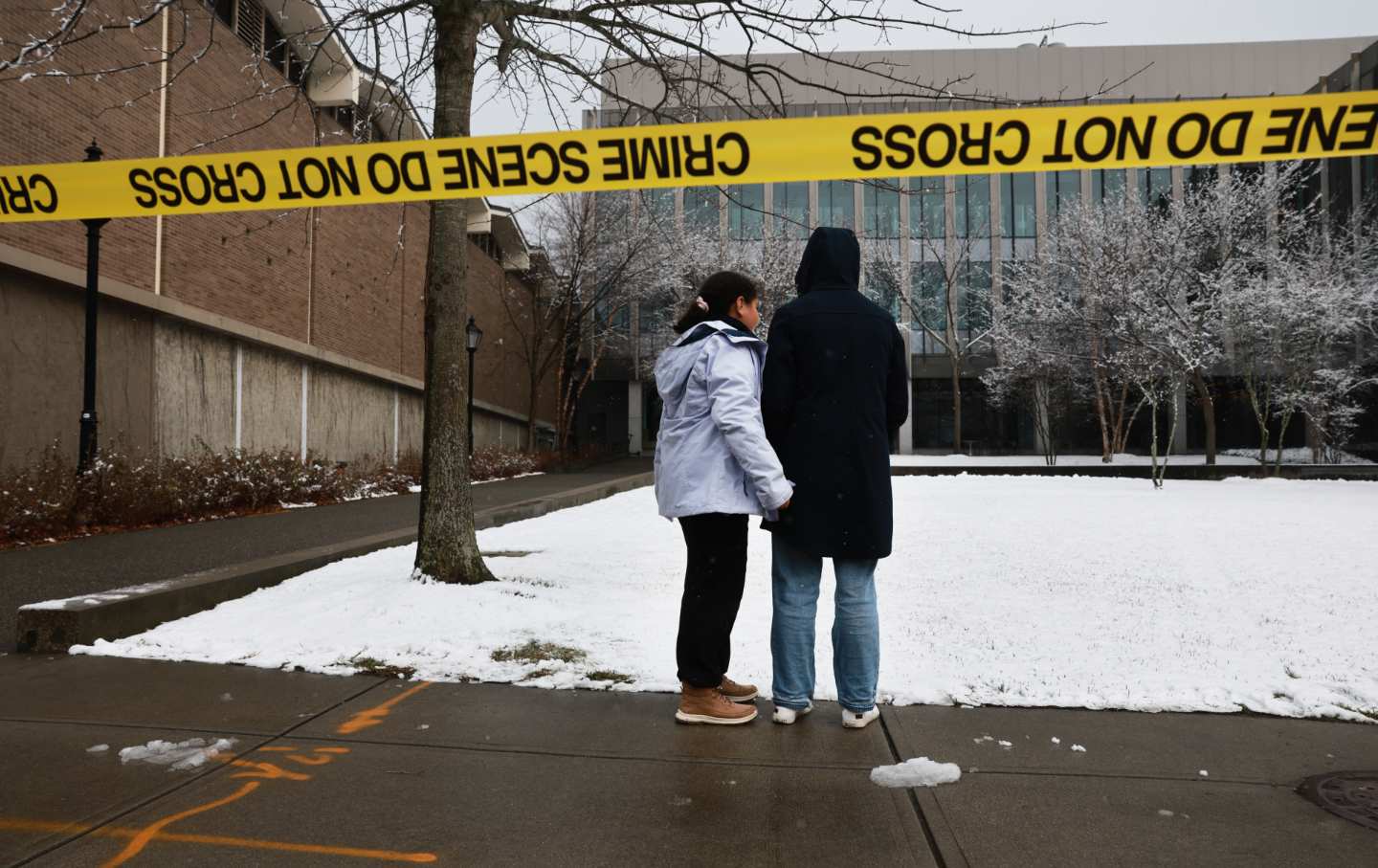
In America, Mass Shooting Survivors Can Never Know Peace In America, Mass Shooting Survivors Can Never Know Peace
A growing number of US residents have lived through more than one massacre.
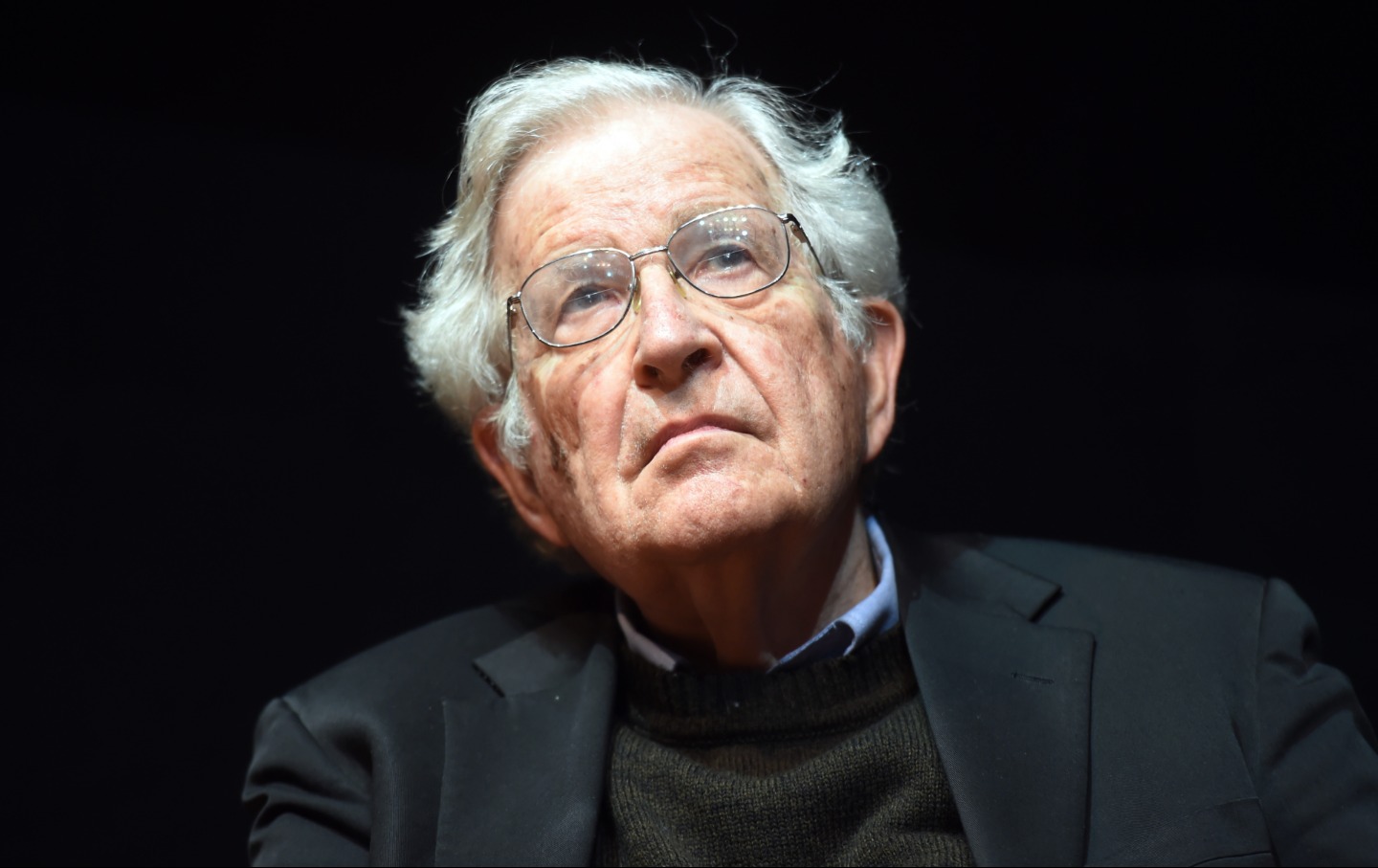
What the Noam Chomsky–Jeffrey Epstein E-mails Tell Us What the Noam Chomsky–Jeffrey Epstein E-mails Tell Us
Chomsky has often suffered fools, knaves, and criminals too lightly. Epstein was one of them. But that doesn’t mean Chomsky was part of the “Epstein class.”
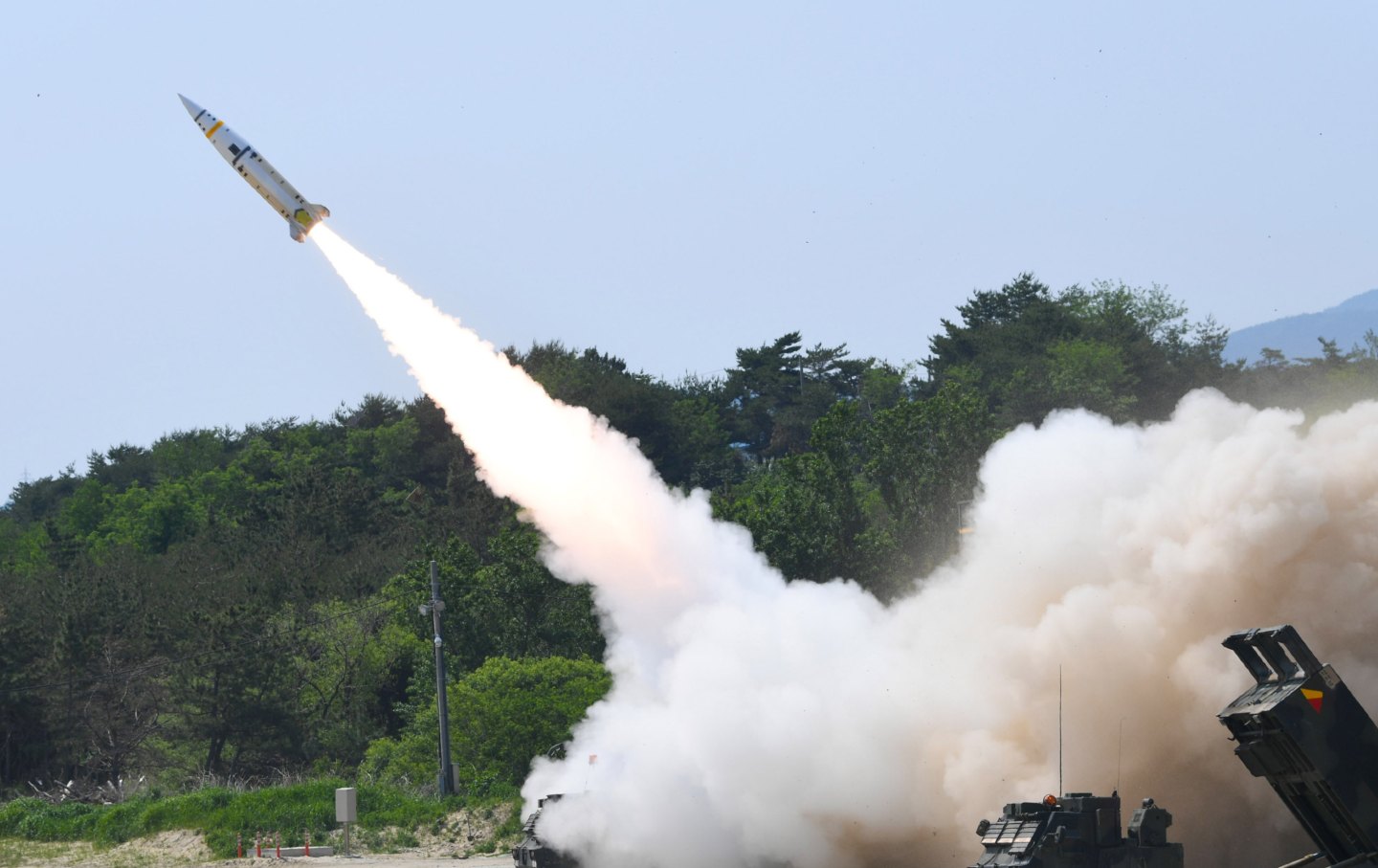
Have We Normalized Nuclear War? Have We Normalized Nuclear War?
If anything, the widespread lack of comprehension (and so protest) is one big reason nuclear war remains so chillingly possible.
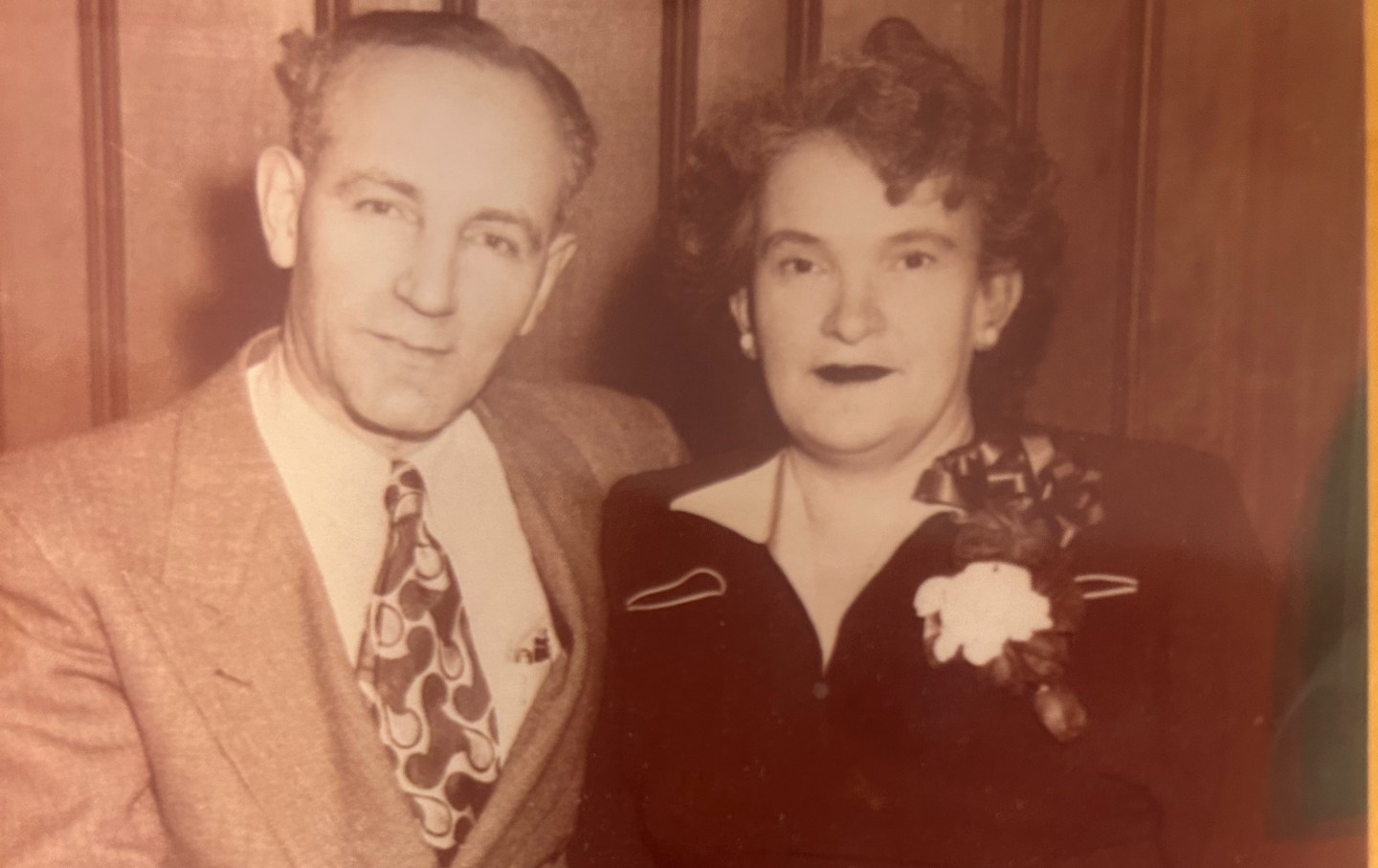
The Supreme Court v. My Mother The Supreme Court v. My Mother
After my mother escaped the Holocaust, she broke the law to save her family. Her immigration story is more pertinent today than ever before.

White Farmers Are Getting a Taste of Their Own Medicine White Farmers Are Getting a Taste of Their Own Medicine
Trump’s tariffs and immigration raids are driving the latest farm crisis. White farmers have stood by him year after year—and still do.
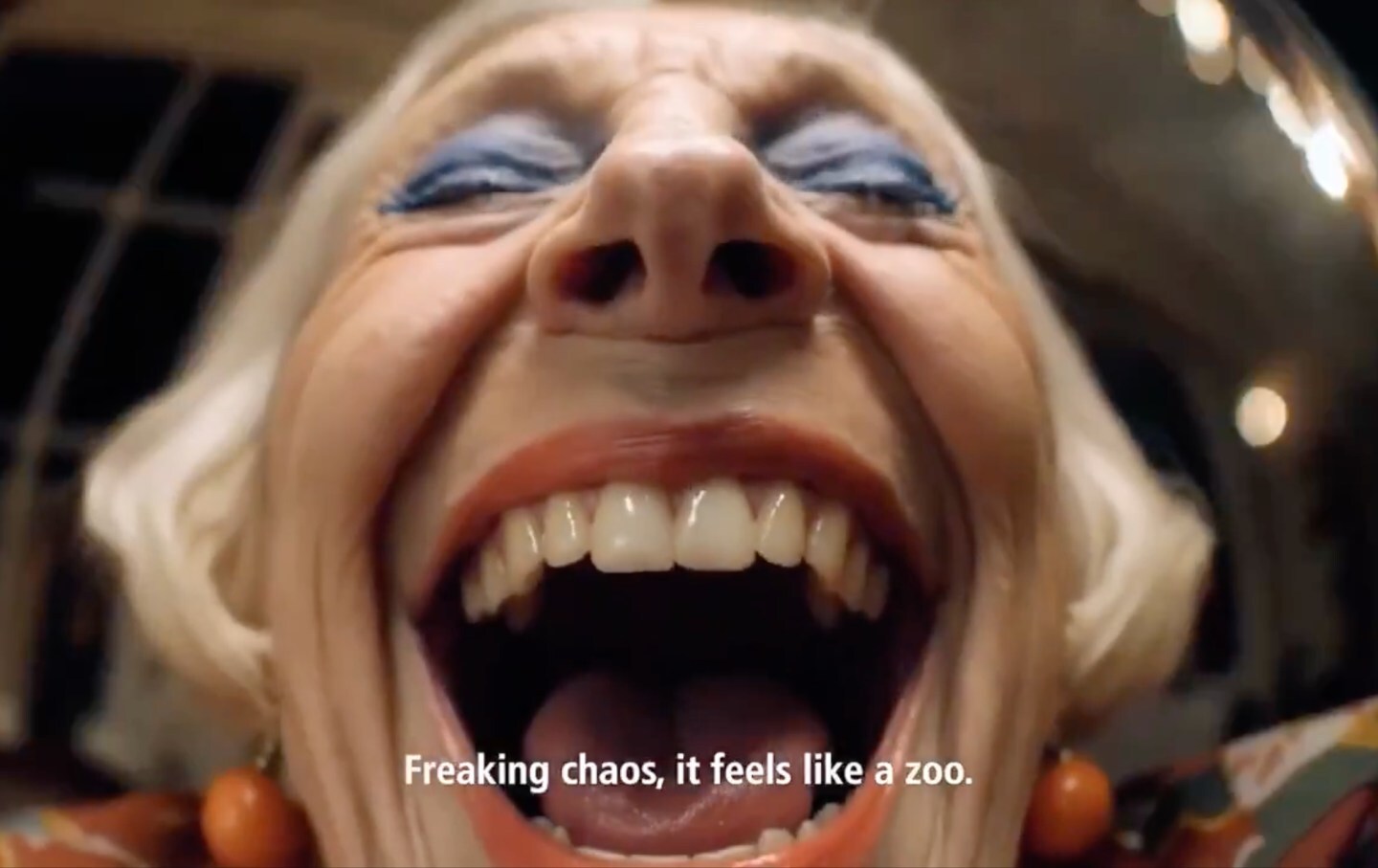
The Slop of Things to Come The Slop of Things to Come
This past week boasted many overhyped AI breakthroughs, but the healthiest one was the fierce repudiation of a contemptuous McDonald’s ad.


